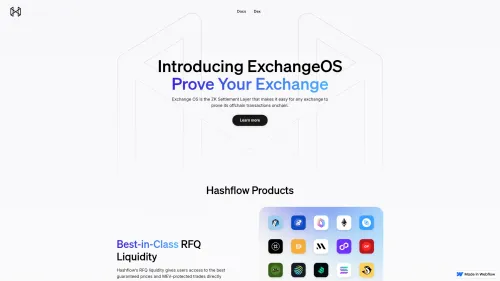Hashflow (HFT)
Hashflow is a multichain decentralized exchange (DEX) that has quickly established itself as a prominent player in the cryptocurrency trading space. By allowing users to trade digital assets across multiple leading blockchains, Hashflow offers an efficient and seamless trading experience. Launched in April 2021, Hashflow has already facilitated over $18 billion in total trade volume, positioning it among the top 10 decentralized exchanges.
History of Hashflow
Hashflow was introduced to the cryptocurrency world in April 2021, aiming to provide a robust platform for trading digital assets across various blockchains. Its rapid growth and adoption can be attributed to its unique approach to decentralized trading, which emphasizes speed, efficiency, and accessibility. As the cryptocurrency market continues to evolve, Hashflow has maintained its position by consistently enhancing its platform and expanding its reach across different blockchain networks.
How Hashflow works

| Ticker | HFT |
| Category | Decentralized Exchange (DEX) |
| Website | https://hashflow.com/ |
| @hashflow | |
| Telegram | hashflowdex |
| https://www.reddit.com/r/Hashflow | |
| Contract Addresses | |
|---|---|
| ethereum | 0xb3...dc Copied! Copied! |
| binance-smart-chain | 0x44...47 Copied! Copied! |
Hashflow operates as a decentralized exchange, meaning it allows peer-to-peer trading without the need for a central authority. The platform leverages an intent-based smart order routing architecture, which plays a crucial role in its operation. This architecture is designed to offer traders the best possible prices by efficiently routing their trade orders through a network of liquidity providers.
Multichain functionality
One of Hashflow's standout features is its multichain capability. It supports trading on several leading blockchains, including Ethereum, Arbitrum, Avalanche, BNB Chain, Optimism, Polygon, and Solana. By enabling trading across these diverse networks, Hashflow provides users with a broader range of options and greater flexibility in managing their digital assets.
Liquidity and token access
Hashflow boasts access to over $8 billion in liquidity, ensuring that traders can execute their orders with minimal slippage and optimal pricing. Additionally, the platform allows users to trade every token available on the supported blockchains, offering a comprehensive and versatile trading environment.
Technology behind Hashflow
Hashflow employs cutting-edge technology to deliver a secure and efficient trading experience. Its intent-based smart order routing architecture is a key component that differentiates Hashflow from other decentralized exchanges. This technology intelligently routes orders to achieve the best prices by tapping into a vast network of liquidity sources.
Security measures
In the realm of cryptocurrency trading, security is paramount. Hashflow implements robust security protocols to protect its users and their assets. By operating as a decentralized exchange, it minimizes risks associated with centralized control and ensures that users maintain control over their private keys and assets.
User experience
Hashflow is designed with user experience in mind, offering a seamless and intuitive interface for traders of all levels. The platform's rapid transaction times, coupled with its extensive network of supported blockchains, make it an attractive choice for those looking to engage in cryptocurrency trading with ease and efficiency.
